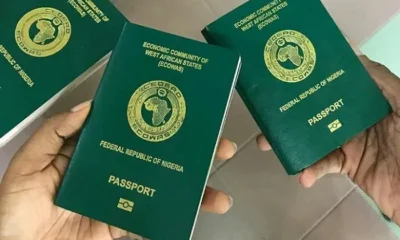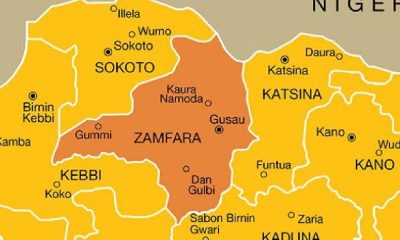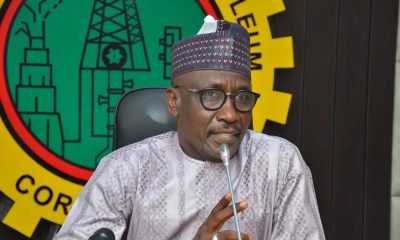Economy
Again, CBN sells $10,000 to BDCs at N1,101/$

The Central Bank of Nigeria has again announced the sales of dollars to Bureau De Change operators.
It disclosed this in a circular uploaded to its website on Monday.
The apex bank said it is set to sell $10,000 to each BDCs at N1101/$ and directed the operators to sell at a spread not more than 1.5 per cent above the CBN rate.
In March, the apex bank sold $10,000 to BDCs at a rate of N1,251/$ and directed the BDCs to sell to eligible customers at a rate not exceeding 1.5 per cent above the purchase price (N1,269/$1).
This followed the bank’s earlier decision to sell foreign exchange worth $20,000 to eligible BDCs across the country in February.
The statement read, ” We write to inform you of the sale of $10,000 by the CBN to BDCs at the rate of 1101/$. The BDCs are, in turn, to sell to eligible end users at a spread not more than 1.5 per cent of the purchase price.”
This recent move follows an appeal by the Association of Bureau De Change Operators of Nigeria to the CBN to adjust and lower its applicable exchange rate below the N1,251/$ it pegged for its members.
ABCON National President, Aminu Gwadabe, stated this in a letter to the CBN Director, Trade and Exchange Department, obtained by The PUNCH.
The parallel market rate of 1,235/$ is lower than the BDCs’ applicable buying exchange rate of 1,251/$ (plus a 1.5 per cent margin) set by the CBN in its latest tranche of interventions.
The CBN directed all eligible BDCs to commence payment of naira deposit into the designated CBN accounts from April 8, 2024.
It also asked the operators to submit proof of payment and other documents at the appropriate CBN branches for disbursement.
As the CBN continues to defend the naira, the latest data on its website showed that Nigeria’s foreign exchange experienced a sharp decline of about $1.02bn within 18 days, as of April 4.
Economy
75.5% of rural Nigerians now live below poverty line — World Bank

The World Bank has disclosed that a staggering 75.5 per cent of rural Nigerians are now living below the poverty line, reflecting deepening hardship in the country’s hinterlands.
This was revealed in the Bank’s April 2025 Poverty and Equity Brief for Nigeria, which paints a grim picture of worsening economic hardship, widening inequality, and persistent underdevelopment across much of the nation.
While poverty is widespread among urban populations, the report emphasised that the situation is significantly worse in rural areas, where economic stagnation, high inflation, and insecurity have exacerbated living conditions.
“Based on the most recent official household survey data from Nigeria’s National Bureau of Statistics, 30.9 per cent of Nigerians lived below the international extreme poverty line of $2.15 per person per day in 2018/19 before the COVID-19 pandemic,” the report stated.
The report also highlighted Nigeria’s enduring regional disparities. “Nigeria remains spatially unequal. The poverty rate in northern geopolitical zones was 46.5 per cent in 2018/19, compared with 13.5 per cent for southern ones. Inequality measured by the Gini index was estimated at 35.1 in 2018/19.
“Nigeria’s Prosperity Gap — the average factor by which individuals’ incomes must be multiplied to attain a prosperity standard of $25 per day for all — is estimated at 10.2, higher than most peers.”
Despite successive policy interventions, these figures underscore a persistent economic divide across the country.
The report’s demographic analysis found that children aged 0 to 14 years had a poverty rate of 72.5 per cent, reflecting the scale of deprivation among the youngest segment of the population.
Gender disparities were also observed, with 63.9 per cent of females and 63.1 per cent of males classified as poor under the $3.65 per day lower-middle-income threshold.
Education emerged as a significant determinant of poverty, with Nigerians lacking formal education experiencing a poverty rate of 79.5 per cent. This contrasts with 61.9 per cent for those with primary education and 50.0 per cent for secondary school graduates. Only 25.4 per cent of those with tertiary education were considered poor.
The report also drew attention to multidimensional poverty indicators, which further reflect widespread deprivation.
According to the World Bank, about 30.9 per cent of Nigerians live on less than $2.15 daily, 32.6 per cent lack access to limited-standard drinking water, 45.1 per cent do not have limited-standard sanitation, and 39.4 per cent have no electricity.
Education access remains a challenge, with 17.6 per cent of adults yet to complete primary education, and 9.0 per cent of households reporting at least one school-aged child not enrolled in school.
The report noted that even before the COVID-19 pandemic, efforts to reduce extreme poverty had largely stalled.
“Before COVID-19, extreme poverty reduction had almost stagnated, dropping by only half a percentage point annually since 2010. Living standards of the urban poor are hardly improving, and jobs that would allow households to escape poverty are lacking,” the report read.
Although the World Bank acknowledged recent economic reforms aimed at stabilising Nigeria’s macroeconomic outlook, it warned that persistently high inflation continues to undermine household purchasing power, particularly in urban areas where incomes have not kept pace with rising costs.
In light of the worsening situation, the Bank called for urgent policy action to shield vulnerable groups from inflationary shocks and to drive job creation through more productive economic activities.
Economy
Naira Records Marginal Decline Against Dollar at Official Market

The Nigerian naira experienced a mild drop in value on Friday, closing at ₦1,602.18 per dollar in the official foreign exchange market, based on figures released by the Central Bank of Nigeria (CBN).
This marks a decrease of ₦5.49 from the rate of ₦1,596.69 recorded on April 30, the last trading day before the May 1 Workers’ Day holiday—indicating a depreciation of approximately 0.34%.
Earlier in the week, from Monday to Wednesday, the naira remained relatively stable, exchanging at ₦1,599.95, ₦1,599.71, and ₦1,596.69 respectively.
Although the local currency showed some consistency mid-week, it wrapped up the week with a loss, following a sligh dip of 0.02% at the beginning of the week
Economy
Black Market Dollar hits N1,610 Amid Economic quagmire

What is the Dollar to Naira Exchange Rate in the Black Market (Also Known as the Parallel Market or Aboki FX)?
Below is the black market exchange rate for the U.S. dollar to the Nigerian naira as of Thursday, May 1, 2025. These are the typical rates at which you can exchange dollars for naira:
Dollar to Naira Black Market Exchange Rate (May 1, 2025):
At the Lagos Parallel Market, also referred to as the black market, Bureau De Change (BDC) operators are buying dollars at ₦1,602 and selling at ₦1,610, according to market sources.
Please note: The Central Bank of Nigeria (CBN) does not recognize or endorse transactions conducted on the parallel market. The CBN advises individuals and businesses seeking foreign exchange to use official banking channels.
-

 News23 hours ago
News23 hours agoFive Asian countries Nigerians can visit without a visa
-

 Entertainment23 hours ago
Entertainment23 hours agoOld Prophecy Of Pastor About VeryDarkman Goes Viral After His Arrest
-

 News23 hours ago
News23 hours agoInsecurity! Bandits abduct 25 female wedding guests
-

 News22 hours ago
News22 hours agoTompolo Launches Door-to-Door Campaign for Tinubu’s 2027 Re-Election!
-

 News22 hours ago
News22 hours agoEzekwesili slams political establishment over harassment allegation, defends Natasha
-

 News10 hours ago
News10 hours agoFormer Plateau deputy governor is dead
-

 News16 hours ago
News16 hours agoINTERPOL uncovers 150 stolen vehicles from Canada in Nigeria, Gambia, other W.A. countries
-

 News23 hours ago
News23 hours agoKyari breaks silence: “I’m not in EFCC custody, I served God, country, not corruption”






